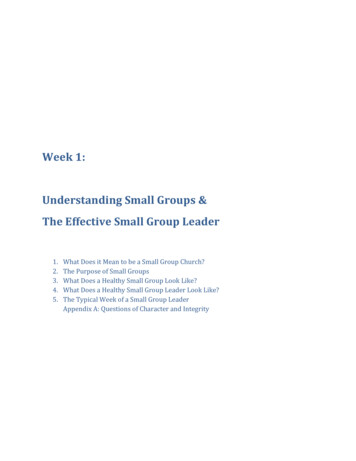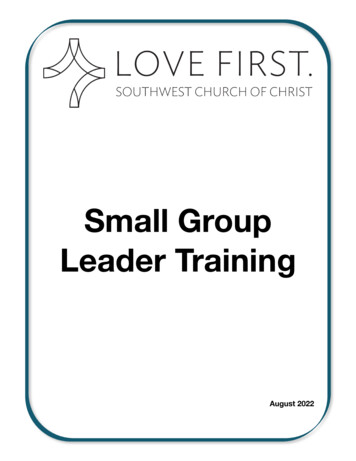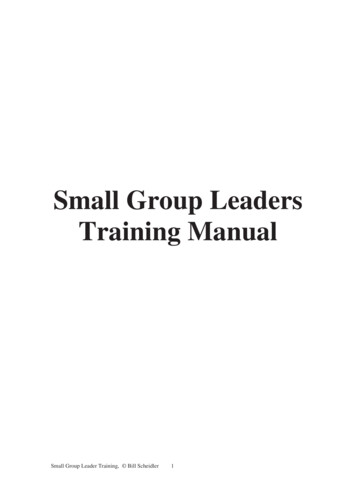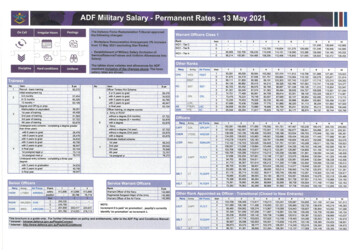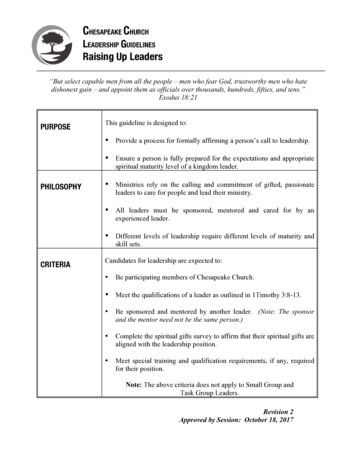
Transcription
“Small Group Leader”Training Manual
Table of ContentsWelcome to the Ministry .2About Us . .3Deliberate Simplicity . .4What Makes Group Meetings Successful . .5-7Leadership Structure and Reporting . 8-9What is a Small Group Leader? . .10The Importance of the Leader In Training . .11Why Groups of 10? . .12How to Start a New Group . . 13Definition of Terms . 14-17Special Acknowledgment . .171
Welcome to the MinistrySmall groups form an important part of all healthy andgrowing churches. Not only do they allow members to buildquality relationships, they also provide a perfect opportunityfor introducing family, friends, neighbors and co-workers toJesus Christ outside of a formal church setting.Nothing is more vital to the success of a small group than itsleadership. The small group leader is the most strategic leaderin the ministry. They are on the front line where outreach andspiritual training take place. This training manual will helpequip you for effective ministry as a Small Group Leader.Small groups are a place of mutual ministry among memberswhere future leaders are developed who can care for othersand train them in the faith. This ministry is at the very heart ofthe mission and vision to which God has called us.Jesus had a compelling vision. He was looking for men andwomen who were willing to become His disciples and go intothe world on His behalf (Matt 28:18-20, Acts 1:8) Jesus sawthousands of neglected people in cities and communities whoneeded His love (Matt 9:36-38). He said, “The harvest isplentiful.” With His help, we will bring in the harvesttogether.Welcome to the team,NSC Staff2
About UsOur Task (Mission):Leading broken people to become spiritually powerful,transformed servants of the Lord Jesus Christ.Our Vision:“To be an authentic Christian community reaching out to nonchurched people with love, acceptance and forgiveness thatthey might know the joy of salvation and a purposeful life ofdiscipleship”Our Focus (Core Values):1. To be a worshipping church devoted to prayer2. Reaching out to non-churched people3. Building the church one small group at a time3
Deliberate SimplicityWe have committed to keeping things ‘deliberately simple’here at NSC. This page and these 5 things make up the mostimportant content in this manual for Small Group Leaders tofocus on, on a weekly basis:1. Start meeting on time, and end on time (and makesure the right things happen in the middle, as detailedout in “What Makes Group Meetings Successful” pgs5-7)2. Identify immediately a ‘Leader in Training’ (this isthe clearly identified person who will be preparing tolead his/her own group when your small group isready to multiply)3. Pray over the ‘empty chair’ every meeting (All oursmall groups have an empty chair in their small groupcircle that they pray over at the end of each meeting this is a constant reminder of our mission to reach outto non-churched people and pray God would give usopportunities to connect with them and bring them togroup)4. Facilitate conversation (Small Group Leaders do20% of the talking, this allows group members tominister to each other and to have more engagingconversation)5. ‘Shepherd’ small group members (Small GroupLeaders accept the responsibility of ‘shepherding’their small group members, this means overseeing thespiritual and physical care of group members)4
What Makes Group MeetingsSuccessful1. Start on time, end on time.This is a very important leadership goal. Groups that start lateor last too long are most often not successful. Sticking to a‘tight’ time frame produces groups that effectively minister totheir members and bear long term fruit. Our small groups meetno less than 2x per month, weekly is ideal.Time format for effective group:A. Spend the first 15 minutes visiting andreconnecting (this allows a margin for those who maybe running late)B. Spend the next 30 minutes in bible discussionbased on “Small Group Questions” from Sundayssermon outline. (This is where most mistakes aremade. If too much time is spent here there will not betime for prayer and one another ministry)C. Spend the next 30 minutes taking prayer requests,personal needs and for praying together (This is wheremost ministry takes place – be sure to allow enoughtime for this)D. Fourth: If you have time left use it for informalconversation. (This can be for some, the best part ofthe meeting)5
Example:6:30 – Start time6:30 - 6:45 – Visit and reconnect6:45 - 7:15 – Study and discussion7:15 - 7:45 – Prayer and ministry7:45 - 8:00 – ClosureThe number one reason for ‘host home burnout’ is the failureto consistently end on time.2. An atmosphere of personal warmth.People who meet together and share the joys and struggles ofeveryday life bond with each other. Everyone needs a placewhere they feel safe, accepted, and loved. This sense ofmutual care and warmth for one another makes the fellowshipof group life very enjoyable. Most groups go through 4 stagesas they develop an atmosphere of personal warmth:A. Trust building B. Transparency C. Truth TellingD. Healing, restoration and Personal growth.3. An opportunity to tell “my story.”A small group is a place where we feel the safety and love toask others to listen to our story. Personal vulnerability openseach other up for the Holy Spirit to work in the lives of groupmembers. Below are the 4 levels of communication:A. Acknowledgment B. Information level C. Feeling oropinion level D. Share my needs/vulnerability level.6
4. Ministry to one another in prayer. A successful meetingis one where the members feel like their needs were met. Theprimary way this happens is when the group members pray foreach other. This opens up our lives to the realm of thesupernatural power of God. A touch from God throughanother’s prayer is a powerful experience.5. Meaningful connections between meetings.What happens between meetings knits people together. Needsdon’t just arise in our lives on the night our group happens tobe meeting. The unexpected and unwelcomed can happen atany time. Being able to reach out to one another during thesetimes by phone, or in person knits our lives together in loveand genuine caring7
Leadership Structure &ReportingSmall Group Leadership Structure:Pastoral Staff (Staff persons who support DistrictShepherds and receive their reporting for reviewand to ensure our people are receiving qualitycare)District Shepherd (A person who supports theministry related needs of 5 Small Group Leaders)Small Groups (These are the moststrategic leaders because they are theprimary care givers who do the ministry)Support/Reporting System:Each Small Group Leader will be able to give a bi-monthlyreport to their District Shepherd (they will get ahold of you).Usually this happens over the phone but can happen via e-mailor in person.The role of the District Shepherd is forsupport/encouragement/prayer and accountability. Your8
District Shepherd is your greatest fan as a Small Group Leaderand will be excited for you and your group to succeed. Theyare also there to help you solve any problems you may have.Most importantly, they will be praying for you on an ongoingbasis.These are some questions your District Shepherd will ask you:a.b.c.d.e.How are you doing in your personal world?How did your last group meeting go?Did you pray over the empty chair?Do you have any exciting stories to report?Are there any problems you need help with?Why Have a Support/Reporting System:In Luke 15:1-7 Jesus tells the story of the shepherd who leavesthe ninety-nine sheep who are safe and goes and searches forthe one that is lost. A good shepherd counted his sheep everyevening when they returned to the sheep fold. This way, if anywere missing, he could go and search for them and save themfrom harm.Our bi-monthly reporting system is about caring for the“sheep” God has entrusted to our care. Reporting is aboutcaring for people.Your District Shepherd creates the most important link at NewSong Church when he/she contacts you. We are committed tosupporting you as you lead your group.9
What is a Small Group Leader?A Small Group Leader is an individual who takesresponsibility to convene a group of ten or less people. Therole of the leader is to oversee the on-the-job training of anemerging leader (Leader in Training, ‘L.I.T’) while facilitatingan environment in which group members can care for andminister to one another (as detailed out in “What MakesGroup Meetings Successful” pgs 5-7). The Small GroupLeader is connected to the larger ministry of the churchthrough a District Shepherd.A Small Group Leader is:1. Someone who encourages and enables group membersto discover insights and build relationships2. The facilitator who stimulates relationships andparticipation by asking questions3. An affirmer, encourager, challenger4. A person who prepares a Leader In Training in orderto multiply the ministry. By doing so the leader:a. Invites team ministryb. Promotes spiritual gift usagec. Puts ministry in the hands of the peopled. Enables the church to reach a larger harvestA Small Group Leader is not:1. A person with all the answers2. Responsible for everyone having a good time3. Someone who does all the talking4. Likely to do everything perfect10
The Importance of the Leaderin TrainingWe all understand the law of gravity. It is at work at all timesin all places. We must constantly contend with it. There isnever a time when it is not in force. We must learn to workwith it in order to function successfully in this world. That isthe way natural laws are, they treat us all the same, noexceptions. One of the “laws” of small groups is that “Thenumber of leaders will determine the number of groups.”Like the law of gravity this law makes no exceptions. Yousimply cannot have groups in the absence of leaders. Being aSmall Group Leader is not a difficult or complex task. It doesnot require in depth knowledge in any field nor does it requireextra organizational skills beyond what the average personalready possesses. What is required is a willing heart and agood connection to a District Shepherd who can providecoaching and support.As groups grow they have the opportunity to multiply. From abiblical standpoint, the multiplication of Disciples is clearlythe will of God. The key to this multiplication rest not in thegrowing size of the group but in the presence of a new leader,referred to here as the Leader In Training. In reality it wouldprobably be better stated as Leader In Waiting, because itreally doesn’t take a whole lot of training to be a Small GroupLeader. Once you have seen a couple of meetings take placeand asked a few questions you probably have all the training11
you need to get started. It is a lot like parenting, you grow asyou go.These are the characteristics of a Leader In Training:1. They have already made a decision that when the timecomes they will lead a group. The Leader In Trainingrole is not that of an assistant who enjoys helping butnever intends to lead.2. They have already emotionally accepted that therelational network as it presently exist will be changedwhen the group is ready to multiply and they arecomfortable with that.3. They are spiritually pointed in the right direction andare willing to be coached by a District Shepherd.4. They understand and are committed to the ministry ofNew Song Church.12
10?Safety in the numberWhy groups of 10?1. Groups of this size are small enough to give genuine care toeach member of the group.2. Groups of 10 are big enough for building meaningfulrelationships.3. When groups grow larger than 10 it is difficult for everyoneto have a chance to share. Some people will becomespectators instead of active participants.4. When groups grow larger than 10 the leader will becomeoverburdened. This causes the leader to quit the small groupor it will hinder the life of the group.5. When groups grow larger than 10 they become “leadercentered” instead of “one-another” focused.6. Every group of 10 is different but if you have children,limited parking or seating anything over 10 usually will causeyou to burst at the seams.7. Groups of 10 provide a family type relationship within thegroup, which make our lives more meaningful in “oneanother” care. Thus a group of 10 sustains a positiveenvironment.13
How to start a new groupYou can do it!1. Make a decision that only you can make. The SmallGroup Leader is the most strategic person in the church, youwill have personal impact on the lives of the people in thechurch. You might not feel qualified, but it is people like usthat God wants to work through. The power to act is neverreleased until a decision has been made. Will you make thatdecision to allow God to lead through you?2. Building a team is the key to success. Either through yourconnections or with the help of a District Shepherd at NewSong Church, you will need a Leader-In-Training and a HostHome. That means before you even begin you will have ateam of 3 to help you. These are people in agreement withyou in the vision of our Small Groups and the Mission of ourchurch to ‘Lead broken people into becoming spirituallypowerful transformed servants of Jesus.”3. If you invite them they will come. Invite people to joinyour group. This is a prayerful group process looking for whoGod wants you to connect with for this group. Do not bediscouraged if it takes time for your group to grow, pray forthe empty chair and let God amaze you with His faithfulness.Your persistence will pay off, God works through the faith ofHis people.14
New Song Church TermsWhat does that mean?Every home, family, business and church have terms or triballanguage they use to identify what they mean when they saycertain words, here are our terms.1. Small Group A Christian community of 3-10 individualsorganized around a self-replicating, lay leadership structurethat has the clearly defined purpose of loving a new person toChrist while they live out an authentic expression of Christianlove to one another.2. Small Group Leader An individual who takesresponsibility to convene a group of ten or less people. Therole of the Leader is to oversee the on-the-job training of anemerging leader (Leader in Training, ‘L.I.T’) while facilitatingan environment in which group members can care for andminister to one another.3. Small Group Ministry Community of Christ followersthat gather in groups of 10 or less to take seriously thecommands of Jesus to love one another and obey the GreatCommission.4. Leader A humble individual who can relate in a healthymanner with his/her peers and who takes responsibility forachieving results.5. Types of Leaders Small Group Leader (SGL); DistrictShepherd (Coach/Pastor); Division Leader (Full time churchstaff)15
6. Leader in Training An individual who has apprenticedhimself/herself to an active Leader in order to learn the skillsnecessary to effectively convene a group of his/her own.7. Empty Chair The chair that a small group prays overeach week signifying that there is room in their group for anew person. By faithfully praying over the empty chair agroup keeps the Mission and Vision God has given it alive.8. District Shepherd A Leader of fifty (Coaches five GroupLeaders) a critical role of being the pastoral, relational,informational, motivational link between the Group Leaderand the Division Leader. Responsible to assist Small GroupLeader in the effective multiplication process of their group.9. Division Leader A Staff Person (or one appointed by theStaff) who sees to it that the right relationships are supported,maintained, multiplied and promoted within their Small GroupDivision. They execute structure and give meaning to thework of others.10. Division A network of 5-10 District Shepherds and thegroups under their care that are supported by a DivisionLeader.11. 10/10’s As Leaders our personal relationship with Jesusis of utmost priority. We spend 10 minutes alone with God inthe Word and 10 minutes alone with God in prayer, daily.16
12. One Another Ministry Simply put, to be willing to beused by God to serve ‘others’ here at New Song Church in allaspects of ministry life, personal life, and time.13. Host Home A person or person’s willing to open aspace, home, or location to allow a Small Group to meet. Thisis a vital role for Small Groups!15. We Give Our Ministries Away No matter what role wehave been given, we are people preparing to give our ministryaway by training others to take our place. When we give ourministry away, God gives more. “Growth of any kind isimpossible without change.”17. Disciple A. Growing knowledge of the bible withpersonal application B. Sharing their faith with others C.Cultivating a private prayer life with God D. Loving otherswhere they are at in recovery E. Serving others.17
Special AcknowledgmentSteve Mason was the founding pastor of Christ the KingCommunity Church in Bellingham, WA in 1988. He was acertified community college instructor, business owner, andadministrator of a private school. In 1996, Steve received hisDoctorate of Ministry from Northwest Graduate School inKirkland, WA. Steve became the lead pastor of ChristCommunity Church in Bellingham, WA in 2012 beforepassing away February 4th 2017. Steve also had a very activeinternational consulting ministry in the fields of small groups,assimilation, church growth and conflict management. Stevecounseled Campus Crusade for Christ InternationalLeadership Academies, as they were an avid ministry toimplore his methods. The vision of small groups was anessential necessity for healthy church growth in Steve’s eyes“Being good at being small” was a consistent theme for theservice of caring for one another as a growing healthy church,and for neighborly, community driven outreach evangelism.Our small group training manual (and overall vision) isheavily influenced by Steve. We are honored with the insightand wisdom passed on to us, we hope to capture this training,to grow it into a greater tool to disciple God’s people at NewSong Church.18
Nothing is more vital to the success of a small group than its leadership. The small group leader is the most strategic leader in the ministry. They are on the front line where outreach and spiritual training take place. This training manual will help equip you for effective ministry as a Small Group Leader. Small groups are a place of mutual .
